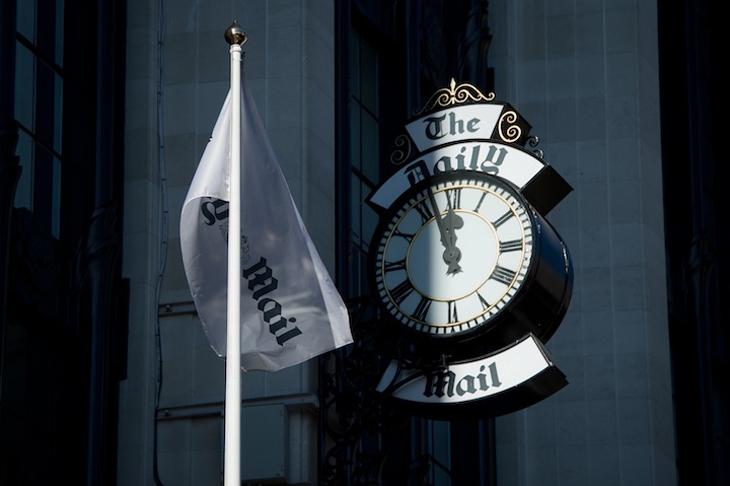According to Private Eye, executives at the Daily Mail were alarmed by the impending publication of Adrian Addison’s new history of the paper. They expected an onslaught. So their hearts must have sunk when they saw the cover of Mail Men. Stephen Fry, who may hate the Mail more than anyone alive, pronounces it ‘a damned good read’; and Polly Toynbee, whose loathing is scarcely less vehement, praises it as a ‘well-informed, diamond-shaped analysis’ of the paper that ‘dominates England’s political culture’.
Possibly neither of these sages has read the book in its entirety. It isn’t the hatchet job that Mail executives feared and its enemies wanted. Admittedly, as a columnist on the paper for many years I may be an imperfect judge. On the other hand, if the book were gratuitously insulting or unfair I might have cottoned on. For the most part it isn’t, though whether it is as acute as it is generally even-handed is less certain.
The first part efficiently retells a familiar story. In 1896 Alfred Harmsworth founds the paper, which Lord Salisbury thought was ‘run by office boys for office boys’. He dies rich and half-bonkers as Lord Northcliffe, and the Mail passes into the journalistically far less gifted hands of his bean-counter
brother, Harold, ennobled as Lord Rothermere. He was the ass who intermittently flirted with Hitler before the war. Addison suggests that, from Northcliffe’s death in 1922 until the paper’s relaunch as a tabloid in 1971, the Mail was in slow decline as it was overtaken by Beaverbrook’s Daily Express, which by the 1950s was selling more than twice as many copies.
David English, editor from 1971 to 1992, made the Mail much livelier than it had been, and set out to attract women readers. He emerges through the reminiscences and anecdotes of contemporaries as a mischievous, mercurial and inspiring man, not invariably wedded to the truth. Many years after the event, he claimed to have been almost at Kennedy’s side when the president was assassinated in Dallas, though in fact he had been 1,600 miles away. Still, Addison (who has worked for the Sun and the News of the World, as well as the BBC) seems mostly to admire him. He also provides a sympathetic portrait of Vere Rothermere, grandson of Harold, who formed a productive and affectionate partnership with English. Vere stroked his friend’s hand in 1998 as he lay dying in St Thomas’s Hospital, where he was himself to breathe his last 12 weeks later.
And so we enter the age of Paul Dacre, already a successful editor of the Mail for six years when English and Vere Rothermere died. Addison recognises Dacre’s journalistic achievements. In his 18 months as editor of the Evening Standard before following English at the Mail, circulation rose by 26 per cent. Daily sales also increased steadily at his new paper — from 1.7 million in 1992 to over 2.5 million in 2003. The Mail has been newspaper of the year countless times. Addison attributes Dacre’s success to a Stakhanovite work regime, manic energy and an eye for sensationalism. Innumerable unidentified former employees are wheeled on to testify to his temper and swearing, characteristics to which he has himself publicly owned up. Many also praise him.
Addison rightly implies that Dacre’s infuriation with the world drives his journalism. It was anger over the authorities’ failure to arrest and charge the killers of the black teenager Stephen Lawrence that led to the Mail’s famous front page branding them as ‘murderers’. The Daily Telegraph virtually called for Dacre to be jailed, and the former Master of the Rolls, Lord Donaldson, accused him of contempt of court, though the less hidebound Lord Denning described it as ‘a marvellous piece of journalism’. Former Mail employee Tim Miles, whose assessments of his old paper are not always laudatory, justly says: ‘That was an extraordinary front page. You would never — never — have seen that on page one of the Guardian. Never.’
There is much more to be said about Dacre than Addison says here. One of my theories is that many of his impulses — suspicion of the Establishment, distaste for the very rich (though he is now of their number) and sympathy for the underdog mistreated by the authorities (for example, Sergeant Blackman, whose conviction for murdering a Taleban terrorist was recently reduced to manslaughter in the Court of Appeal after a Mail campaign) — have their roots, at least in part, in his youthful left-wing beliefs. This is not an insight most of his critics on the left would share.
Post-Brexit, they seem more obsessed with the Mail than ever, though it is, by my calculations, read by only 7 per cent of the adult population. They ignore the inexorable fall in sales of the Mail — granted, not as precipitate as most other newspapers’ — as a result of the internet. Circulation now stands at around 1.5 million copies a day. It’s true that Mail Online has become the most visited newspaper website in the world outside China, which is a phenomenal journalistic achievement. But it’s not, at least so far, a commercial success. As Addison notes, though he doesn’t really develop the thought, the values of Mail Online (worship of celebrity and an infatuation with half-naked women) are strikingly at odds with those of the conservative Mail. Moreover, as two thirds of its audience is outside Britain, it is inevitably more internationally minded than the fiercely patriotic Daily Mail.
So the future will be very different if Mail Online continues to expand, and the paper to decline. Not that the Stephen Frys and Polly Toynbees and most of the Mail-hating liberal left realise it. My advice to them is to relish their hatred while they can.






Comments